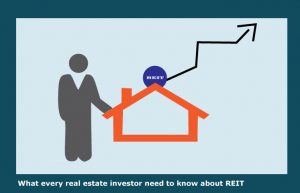Co-wholesaling-REIT- real estate investment trust… REITs’ are companies that have possession of income-producing real estate …Without much trumpet call, real estate investment trusts, or REITs, have turn out to be one of the past decade’s fastest-growing investments. To make it more clear, in the recent years, real-estate investment trusts that invest in all types of commercial real estate, have been contributing adequately for investors and there are certain things that you need to know about REIT’s and this article will reveal what every real estate investor should know about REIT.
• Volatility: REITs aren’t lackluster, steady investments, but they do fluctuate meaning they go up and down and sometimes stridently move in and out of good turn with investors.
• Not like buying a house: Some people have a mistaken impression that REIT’s are like buying a house, but the fact is that they are nothing like traditional homeownership. To put it simple, it is much like a specialized mutual fund that may invest in any of an extensive assortment of companies that put up, own and manage commercial real estate.
• Strong long-term performance: As a matter of fact, REIT’s had a long history of producing good returns and from 1975 through 2014 there have been favorable market conditions.
• Short-term performance effect: While strong long-term performances are said to have a favorable circumstance for real estate investors, short-term performances of REIT’s can have adverse effects.
REIT qualifications
As a professional real estate investor, you should know about the qualifications of a real estate investment trust. For a company to make the grade as a REIT it must be an entity that is taxable as a conglomerate and a bare minimum of at least 75% of the company’s total assets should be invested in real estate. In addition, it should draw from it, at least 75 percent of its gross earnings from rents from real property, interest on mortgages financing real property or from sales of real estate. With that said, it should have a minimum of 100 shareholders and shall pay at least at least 90 percent of its taxable income in the form of shareholder dividends each year, while not having more than 50% of its shares held by more than four or fewer individuals which should be administered by a board of directors or trustees. The aforesaid eligibility criteria’s sometimes differ according to state laws and rules.
Hope this article was helpful. If you are looking to learn more about real estate concepts in detail, then without further ado consider attending Zack Childress’s seminar which will be helpful to you by all means. Zack Childress is a real estate mentor who helps aspiring realtors to become more successful by teaching them real estate principles, markets, and finance. If you ever wanted to excel by building your knowledge and skills, keep tuned to Zack Childress seminars and camps that will help you to build your skill base and take a client-oriented approach to your business.













